Healthy Store Bought Oat Milk Guide 2024
Written by:
Suzanne Weaver-Goss
02/29/2024
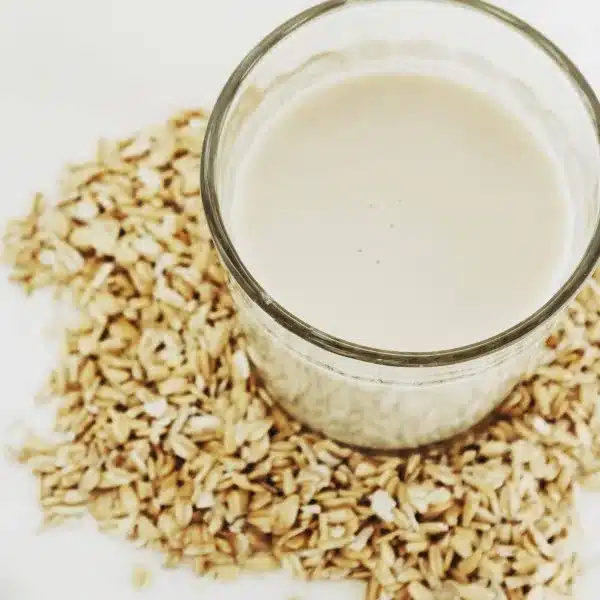
Updated: 02/29/2024
Looking for a different guide? Browse them all HERE.
Written by Suzanne, Certified Holistic Health Coach
I’ve been consuming plant-based milks since the 1970s. It’s been overwhelming (in a good way!) to see the market expand to include so many alternative milk products made from a variety of nuts, grains, and legumes.
After we published a Healthy Almond Milk Shopping Guide, you guys asked (and asked!) fpr us. Now, because you guys asked (and asked!), we are pleased to bring you an Oat Milk Guide to help you find the best store-bought oat milk.
Oat milk is enjoying increased popularity because it’s plant-based, nut-free, and soy-free. I prefer oat milk over many plant-based milks. The biggest problem with oat milk is that it typically has more carbohydrates and sugars than other plant-based milks (more on that, below).
Oat Milk Ingredients
All oat milks include at least oats and water, and the best store-bought oat milk brands will contain only those ingredients.
Many other oat milk products also have sweeteners, oils, thickening agents, emulsifiers and stabilizers, flavorings, preservatives, and added vitamins and minerals. These additives are used to enhance texture, appearance, performance, shelf-life, and nutritional profile. They can also be problematic for a variety of reasons. Consider the following:
- Added sweeteners might produce a yummier milk, but simple sugars can raise your blood sugar and insulin levels. Most of us don’t need any extra sugar in our diets! (Read more in the sugar section, below.)
- Added oils in oat milks typically come in the form of lower-quality seed oils, like rapeseed or canola. These sources of fat can throw off a healthier fatty acid ratio; most of us need more omega-3 fatty acids but get a lot of omega-6 fatty acids from plant-based oils. This can result in increased inflammation, which none of us needs! The best store-bought oat milk brands have just the small amount of fat that occurs naturally in the whole oat.
- Flavoring ingredients (even “natural flavors”) are highly complex, not very natural, and opaque ingredients–as consumers, we don’t know what’s actually in them. Good old vanilla extract is the only flavor ingredient that you’ll see on the best store-bought oat milk labels.
- Ingredients used to thicken, emulsify, stabilize and preserve oat milk can include gums and mineral salts. While these additives are generally considered safe in low amounts, many of them are highly processed and may not be tolerated well by some people. If oat milk is a staple in your diet, you probably want an additive-free product. The best store bought oat milk will be free of all of these additives.
- Added vitamin and mineral ingredients might look good on the nutrition label, but they can be highly processed, and they aren’t necessarily bioavailable (able to be absorbed by the body). I prefer to get most of my nutrients from whole-food sources. Again, the best store-bought oat milks won’t be packed with added synthetic vitamins.
Sugar in Oat Milks–Extra Sneaky
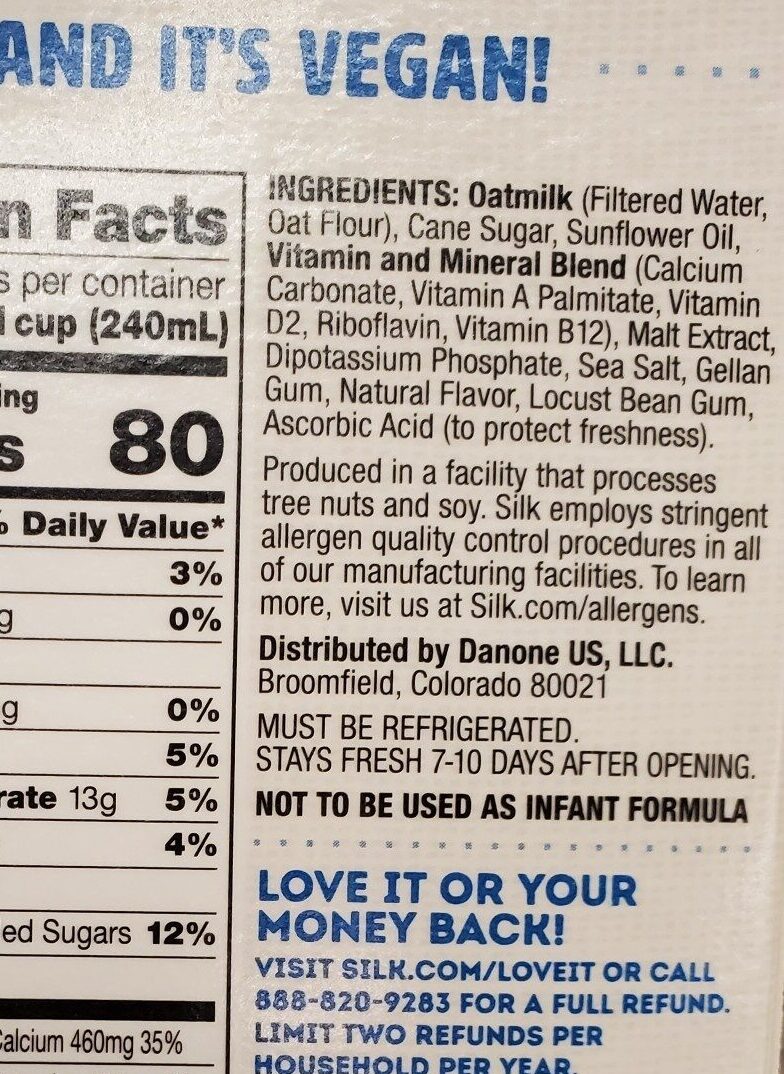
Because cow’s milk is naturally sweet, we expect milk alternatives to have a little sweetness, too. Many plant-based milks include sweeteners to make their products appealing to consumers who are switching from dairy milk.
Oat milks are a little tricky when it comes to sugar content. If you look at the ingredient list for many oat milk products, you won’t see any added sweeteners. But, if you look at the nutrition label, you’ll see plenty of sugar.
Why is this?
Oat milk manufacturers typically use enzymes to partially break down the oats to make the milks creamier and sweeter. Naturally occurring oat starches become a simple sugar called maltose.
The good thing about this is that manufacturers can use fewer (or no) additional ingredients to get the creaminess and sweetness that make their products appealing. The bad thing is that the product can be sweet and high in carbs and sugar while still technically having “no sugar added.”
Manufacturers do have to list these sugars on the nutrition label, so if you’re watching your sugar intake, check for “total sugars” and “added sugars.” There are some zero-sugar oat milks that are made without this enzymatic process and have some carbs but no simple sugars. I’ve included a couple of these products among my recommendations below.
An important difference between cow’s milk and oat milk is that the lactose in dairy doesn’t impact blood sugar responses as much as maltose and added sugars do. So even if you’re not sugar conscious in general, do watch out for the added sugars in oat milk.
Is the Best Store-Bought Oat Milk Fortified?
Some oat milk brands add minerals, vitamins and even protein to mirror the nutritional profile of dairy milk. These packages might boast about the content of calcium, vitamin D, or vitamin B-12. But do you need this?
Personally, I use oat milk in place of cow’s milk, but I am not looking for the nutrition that I would get from cow’s milk. I eat a healthy diet and supplement with a multi-vitamin and vitamin D, so I choose a non-fortified oat milk.
You may prefer a fortified oat milk if you’re seeking a nutritional replacement for dairy. None of the Best Stuff is in this category because of the additional ingredients. If you want a decent fortified oat milk, check out some of the products listed in Okay Stuff.
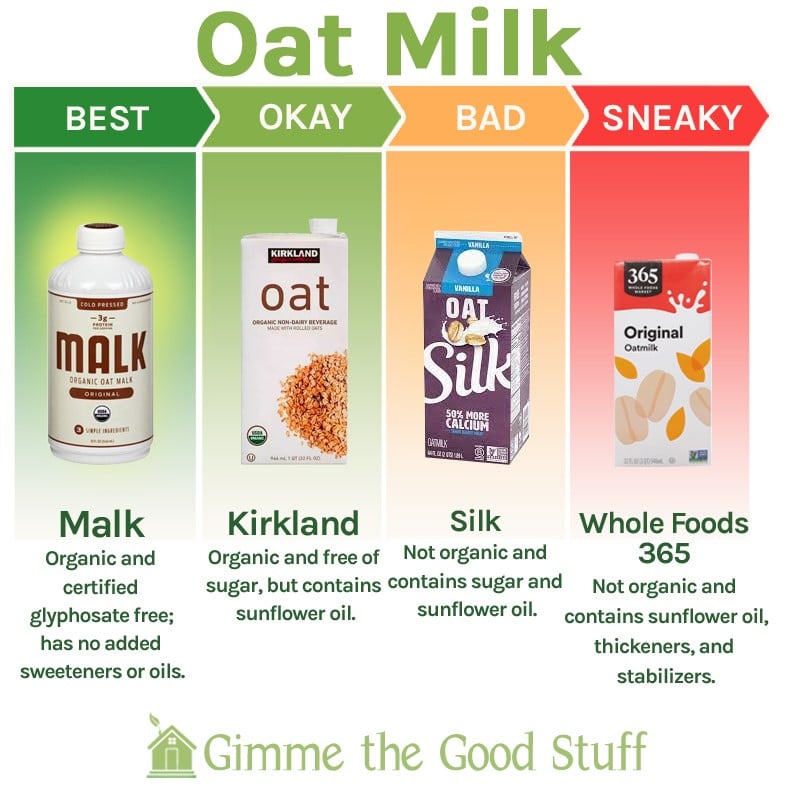
Hidden Scary Stuff in Oat Milk
Glyphosate, the carcinogenic active ingredient in Monsanto’s RoundUp and other herbicides, is widely used in the cultivation of oats and many other common crops.
In 2018, the Environmental Working Group (EWG) commissioned two studies that found concerning levels of glyphosate in an alarming number of common oat-based cereals and foods. These included including popular children’s foods. In fact, most of the conventional products had elevated levels of glyphosate, and about a third of organic products did, thanks to cross-contamination.
Because of this, we only call oat milk Good Stuff if it’s organic and/or certified glyphosate-residue free by The Detox Project. The best store-bought oat milk is both organic and glyphosate-residue free.
If oat milk is a staple in your diet, I highly recommend that you opt for a glyphosate-free product.
A Note About “Barista” Oat Milks
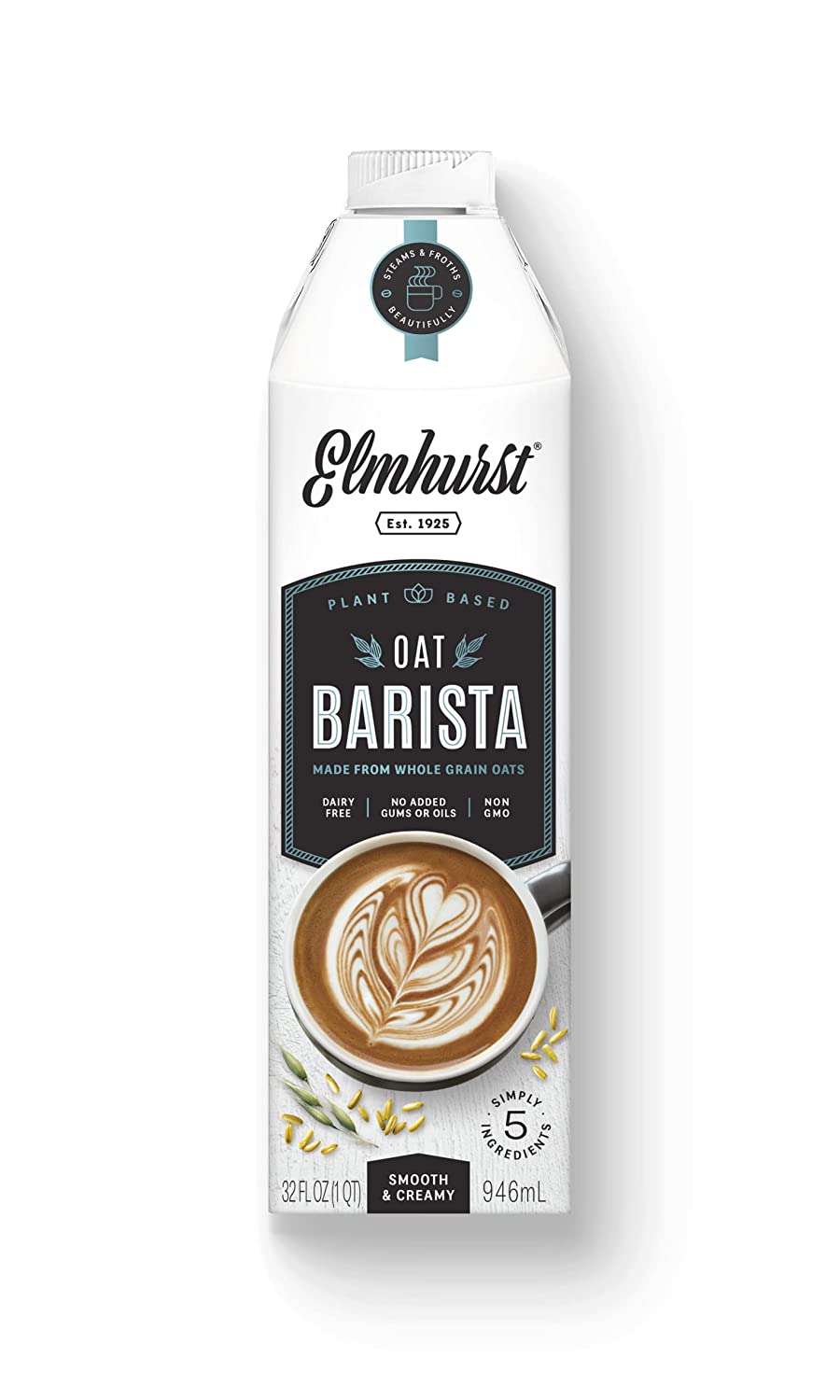
These blends tend to have higher amount of oils and additive ingredients in order to make them extra creamy. I did find two barista oat milks that are Okay Stuff:
- Elmhurst Oat Barista Edition also has a short list of ingredients: filtered water, whole grain oats, cane sugar (a very small amount), dipotassium phosphate, and salt. It’s not organic, but Elmhurst oat milks are certified glyphosate-free.
- Minor Figures Barista Oat (Organic) is a decent pick for people looking for a creamy, foaming-friendly oat milk. The ingredients are water, organic oats, organic sunflower oil, salt, and potassium carbonate. I don’t like the sunflower oil, but I do like that it’s organic and this milk doesn’t have many of the additives you find in most other barista products.
Homemade Oat Milk
Thirty years ago, when I followed a macrobiotic diet, I made my own oat milk. I cooked whole oats with lots of water and then strained them. The result was fairly bland, but quite thick and creamy. Today, it is much easier to make yummier versions of these milks with a plant-milk maker. This is the one we have and recommend. I like using steel-cut oats for the most nutritious version possible.
Healthiest Store-Bought Oat Milk
To find the healthiest oat milk in the grocery store, look for:
- Organic and/or certified glyphosate-residue free labels.
- Oat milks with no added sweeteners, thickeners, or stabilizers.
- Ingredient lists of a few necessary, familiar ingredients.
- Oat milk without oil added.
Five oat milk brands meet my standards for the best oat milk.
Good Stuff: The Best Oat Milk
Elmhurst Milked Oats Unsweetened Oat Milk
- This is not organic oat milk, but it is Detox Project certified glyphosate-residue free
- Ingredients: filtered water, whole grain gluten free oats, salt
- $0.21/fl oz
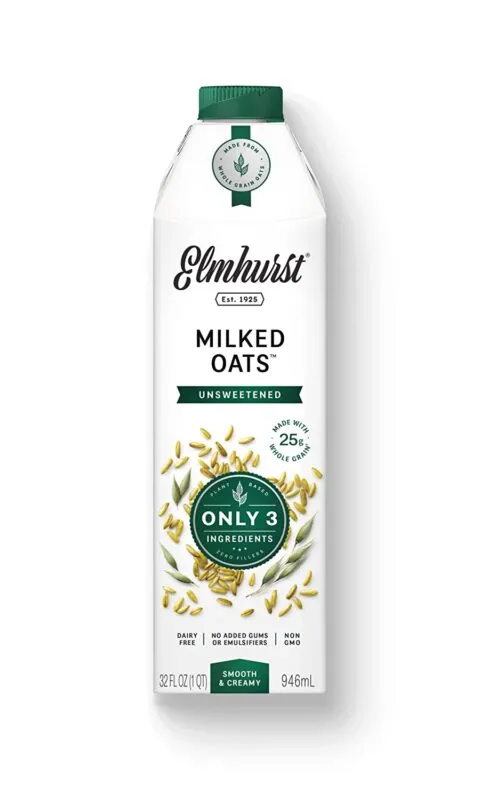
Maker Oat Milk
- Plant-based powdered organic oat milk
- Ingredients: organic oats, allulose, rapeseed protein, avocado oil, acacia fiber, seaweed-derived calcium, sea salt
- $1.79/oz

Oat MALK Original
- The very Best Stuff
- Organic oat milk, Detox Project certified glyphosate-residue free
- Ingredients: filtered water, organic gluten free oats, and himalayan pink salt
- $0.23/fl oz
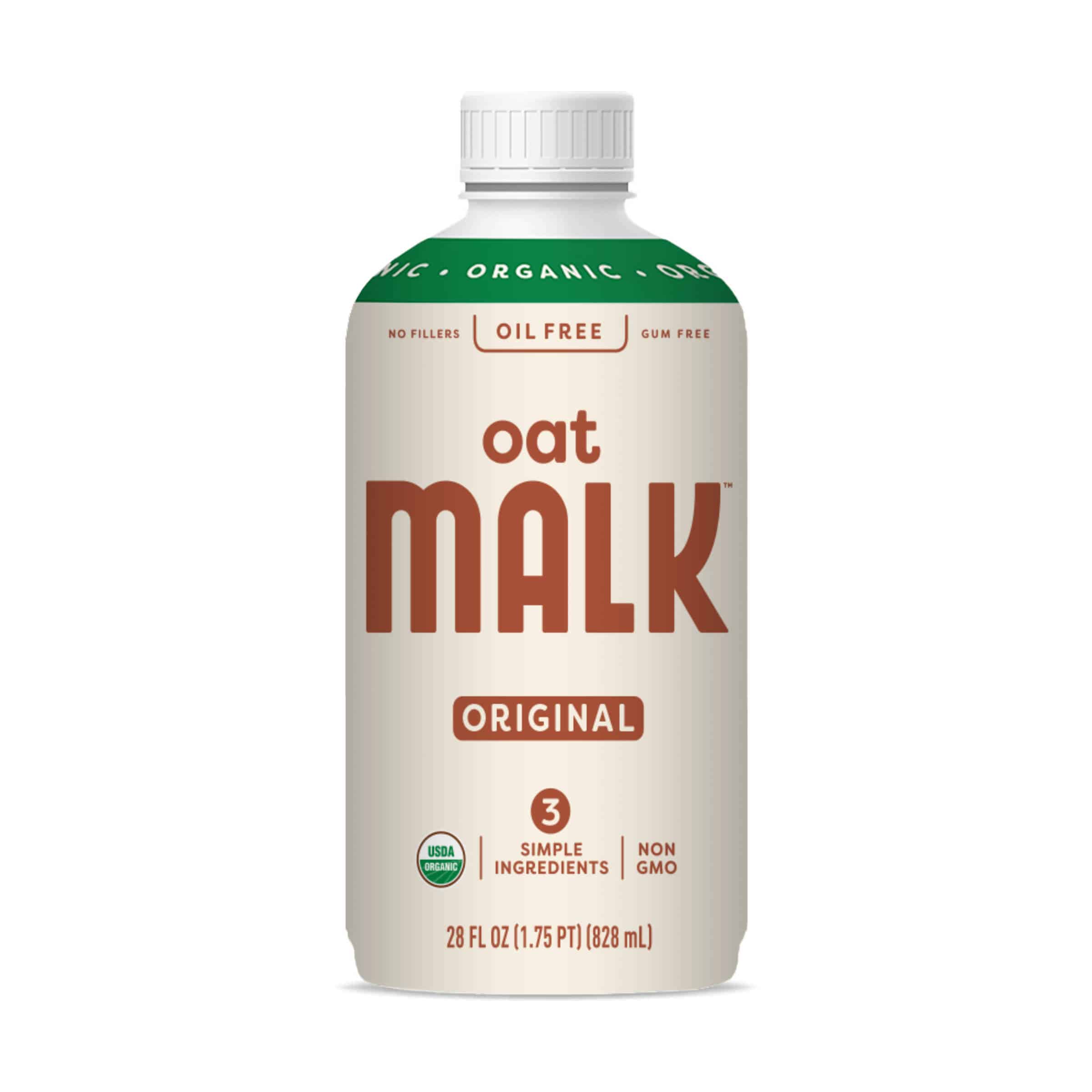
Thrive Market Organic Oat Beverage
- Natural, organic oat milk
- Ingredients: water and organic oats
- $0.12/fl oz
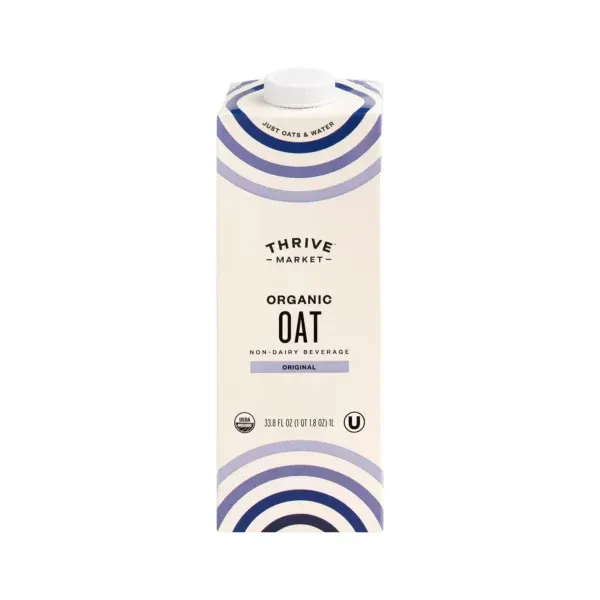
Willa’s Unsweetened Original Oat Milk
- Organic oat milk made using the whole oat
- Ingredients: filtered water, organic whole grain oats, organic vanilla extract, and salt
- $0.19/fl oz
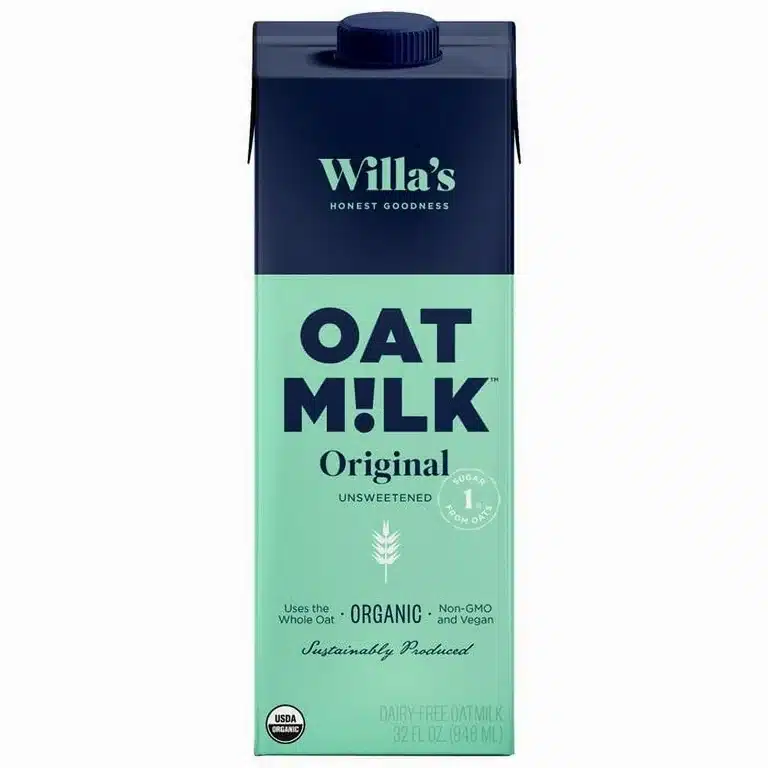
Okay Stuff
We call the following nine brands of oat milks Okay Stuff because they’re organic and/or glyphosate free and have relatively simple ingredients. That said, I personally do not buy any of these brands, as they contain additives. If you’re looking for a nutritional replacement for cow’s milk, some of these brands are worth considering.
Califia Farms Extra Creamy Oatmilk
- This is not organic oat milk, but it is certified glyphosate free
- The ingredients aren’t horrible, but more contrived than Good Stuff
- Ingredients: water, oats, sunflower oil, dipotassium phosphate, calcium carbonate, tricalcium phosphate, sea salt
- $0.10/fl oz
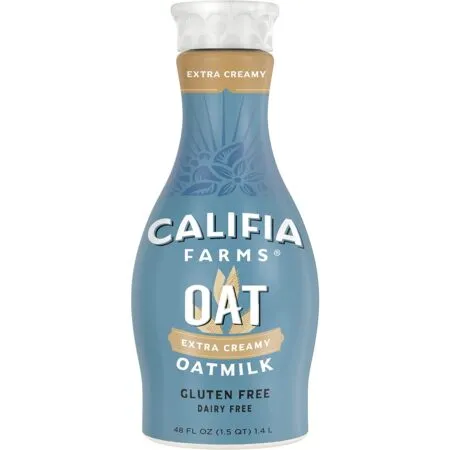
Chobani Oat Zero Sugar Plain
- Glyphosate-residue free and no added sugar
- I’m concerned by the “natural flavors” and “nutrient extract blend”
- Ingredients: water, whole grain oats, rapeseed oil, sea salt, natural flavors, vitamin A palmitate, vitamin D2 (yeast extract), calcium carbonate, gellan gum, dipotassium phosphate
- $0.08/fl oz
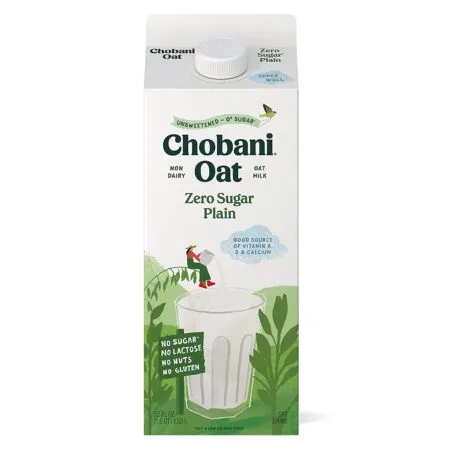
Kirkland Signature Organic Non-Dairy Oat Beverage
- Organic oat milk, but contains many additives
- Ingredients: filtered water, organic rolled oat flour, organic sunflower oil, calcium carbonate, sea salt, sunflower lecithin, organic natural flavors, vitamin D2, vitamin A palmitate, vitamin B2, vitamin B12
- $0.31/fl oz
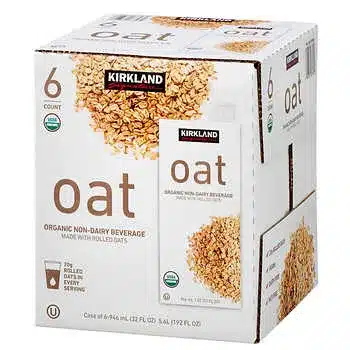
Mooala Organic Coconut Oatmilk
- Made with coconut cream rather than lower quality oils
- Organic oat milk with zero sugar (but their processing method lacks transparency)
- Ingredients: filtered water, organic oat flour, organic coconut cream, organic agave fiber, calcium carbonate, sea salt, gellan gum, organic cinnamon
- $0.17/fl oz
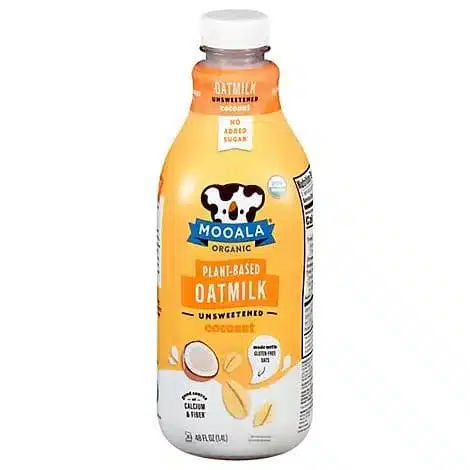
Oatly Oatmilk and OatMilk Chilled
- Not organic, but certified glyphosate free
- Contains rapeseed oil, but it is non-GMO and hexane-free
- Ingredients: water, oats, rapeseed oil, dipotassium phosphate, calcium carbonate, tricalcium phosphate, sea salt, dicalcium phosphate, riboflavin, vitamin A, vitamin D2, vitamin B12
- $0.16/fl oz
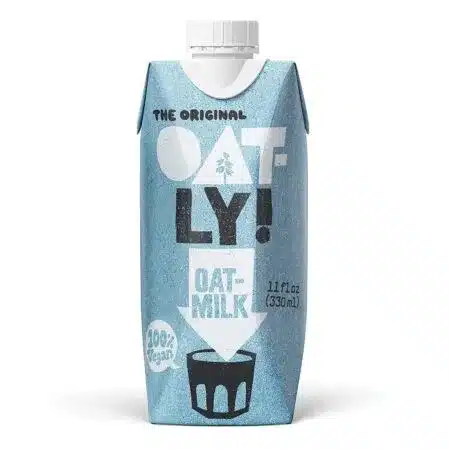
Oatsome Organic Oat Milk
- Organic, gluten free oat milk with no added sweeteners
- Simple ingredient list, but does include about 1% oil
- Ingredients: water, organic gluten free oats, organic sunflower oil, sea salt, calcium carbonate, riboflavin, vitamin D, vitamin B12
- $0.09/fl oz
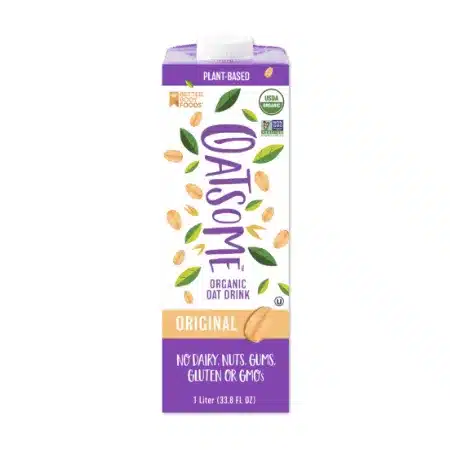
Pacific Foods Organic Reduced-Sugar Oat Original
- Contains additives, but is organic and has less sugar than other oat milks
- Ingredients: water, organic oats, organic oat bran, gellan gum, sea salt, tricalcium phosphate, vitamin D2
- $0.12/fl oz
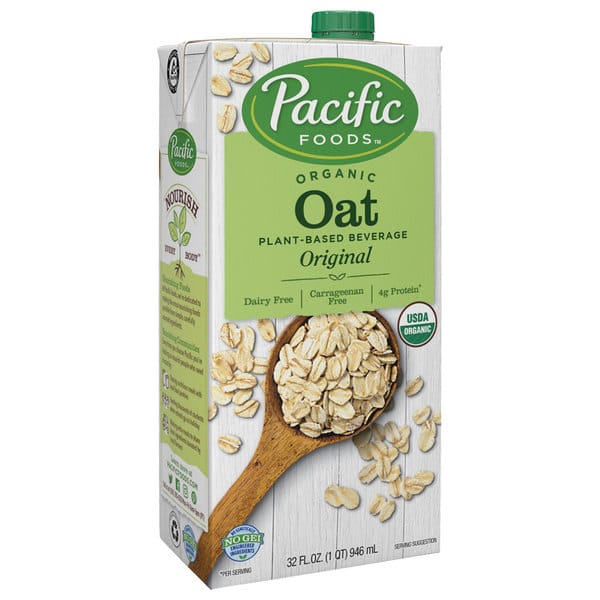
Planet Oat Original Oatmilk
- Planet Oat’s Original, Unsweetened Original, and Shelf Stable Original Oatmilk are not organic, but they are certified glyphosate-free
- The additives are typical but not my favorite
- Ingredients: filtered water, oats, calcium carbonate, dipotassium phosphate, guar gum, sea salt, gellan gum, vitamin A palmitate, vitamin D2, vitamin B2, and vitamin B12
- $0.07/fl oz
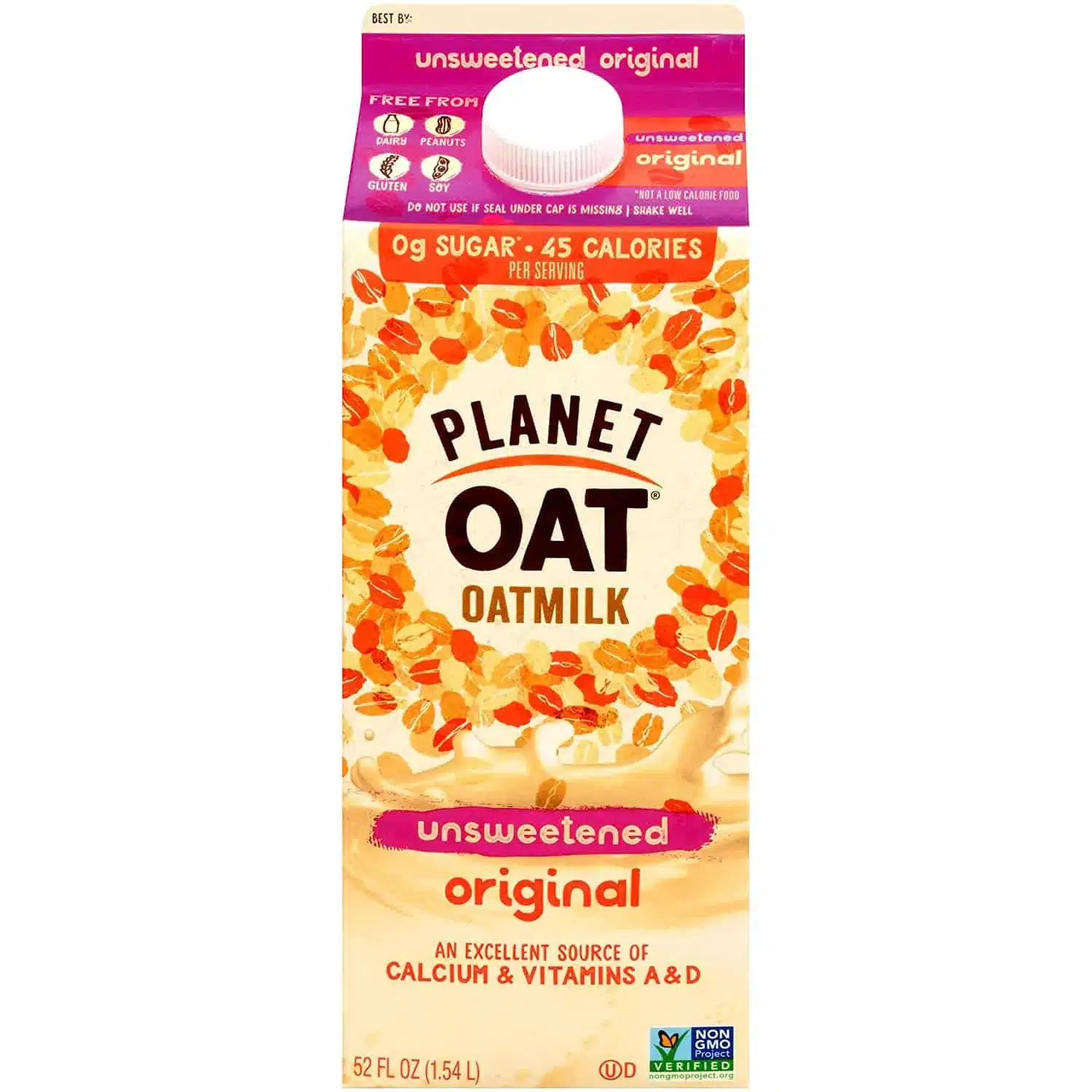
RISE Brewing Co. Organic Oat Milk (Original)
- Simple, organic ingredients
- Certified glyphosate-residue free
- Both the Original and Vanilla flavors lack transparency about added ingredients
- Ingredients: organic oats, organic sunflower oil, water, sea salt
- $0.16/fl oz
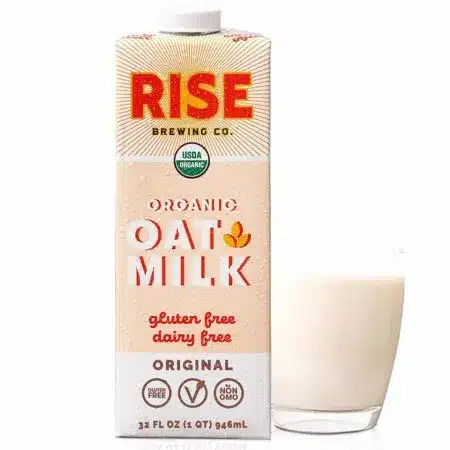
Bad Stuff
We suggest that you avoid all the brands of oat milk that aren’t organic and/or glyphosate free, as well as those that have longer lists of ingredients–-including lower-quality oils, sugars, and additives.
These include:
- Silk Oatmilk
- Aldi’s Friendly Farms Oat Milk
- Dream Oat Milk
- 365 Oatmilk Beverage
- Trader Joe’s Nondairy Oat Beverage
Are there oat milk brands not mentioned here that you want to know about? What is your preferred “clean” oat milk? Which is your favorite brand when it comes to taste? We’d love to know!
Read more about our choices for the safest products for your family here.
To your health,


Suzanne, Certified Holistic Health Coach
Note: This article contains affiliate links or sponsored content, which means that if you make a purchase, we may earn a commission. We only recommend products that meet our strict standards for non-toxicity and that we use (or want to use!) ourselves. Thank you so much for supporting the brands that make Good Stuff!
Enjoying this guide?
Join 60K families who rely on our free guides on everything from milk to mattresses! Sign up to get $5 off your first order, access to our ultimate Clean Products Cheat Sheet, and ongoing exclusive access to coupon codes and promotions. Our weekly newsletter is filled with well researched tips and tricks to live a toxin-free lifestyle.
Related Posts
How To Avoid Drinking Toxic Tea
The Healthiest Organic Wine Brands We’ve Found
Healthy Thanksgiving Recipes
Daylon’s Healthier Fried Chicken Sandwich
8 responses to “Healthy Store Bought Oat Milk Guide 2024”
-
Hi Suzanne
Two things The link to whatever product you use to make your oat milk came up with nothing, what do you use to make your oat milk?
I don’t have high hopes for this but do you have any info find Great value oat milk I’m sure it’s going to be bad. I literally can’t find anything out about it thanks so much-
Hello, You’re right the link doesn’t work. I will fix it. I have made oat milk with rolled oats, steel cut oats and whole oats. The less processed oats are the healthiest. Great Value oat milk from Walmart has canola oil so I wouldn’t recommend it. Oats have so much creaminess on their own that I think they add oil because they’re using less oats. We found with almond milk that many of the producers use one almond per quart and then fill it with oil and thickeners.
-
This link is fixed.
-
-
-
Hi there,
What do you think of the Suzie’s Oat milk?
Thank you.
-
Hi! Which top two Oatmilk from the okay stuff would you recommend on a daily basis in replace of cow milk?
-
Suzanne
I recently ‘found’ Elmhurst brand milked oats and besides loving the taste and creaminess, wow 3 simple ingredients. However, concerned about glyphosate residue, I was delighted to see they are certified glyphosate free by the Detox Project. However, upon further scrutiny, I see no certification label granted by them on Elmhurst carton. Interestingly, Oat Malk does have it so it makes me question Elmhurst now (yikes). I din’t know if my store carries Oat Malk- how do they compare in taste??
Also you9 stated you use steel cut oats and the Nutr milk machine which I have been considering purchasing. Can you inform me where you get your oats (can I assume they are glyphosate free?)BTW….I too followed a macrobiotic diet for years.
I am so grateful for all the work and research your and your family does to help keep us all safe and healthy. So very grateful. I am a certified holisticnurse and diabetes educator so this is important to me and my patients…
-
Hi Paula,
Thank you for your support and your great questions. I got your voicemail and will follow up with a phone call to you. I am taking Elmhurst’s word for it that they are part of the Detox project and glyphosate free. However, I always prefer organic oats which they don’t use. I was really torn when rating these but I also don’t like the oils that most Oat milks use. and Elmhurst is basically just oats. For home use, I either make my own or use MALK. I don’t drink OatMilk and use it pretty sparingly in smoothies (in warm weather) or sometimes in a decaf coffee. I actually prefer Almond Milk. Whenever I buy Oats I only buy organic oats to be sure that they are as glyphosate free as possible. It is very challenging to avoid glyphosate even in organic food. It is used a lot in agriculture in the US and many homeowners use it in their yards and gardens. It is everywhere! Keep in mind that any processing of food is a compromise for your health. I like eating oats mostly as a grain. Hope this helps.
-
-
Hi Grace,
It depends on if you’re drinking it or just using small amounts. If I were consuming OatMilk as a staple in my diet, I would only either consume Good Stuff or make my own.
Suzanne
-

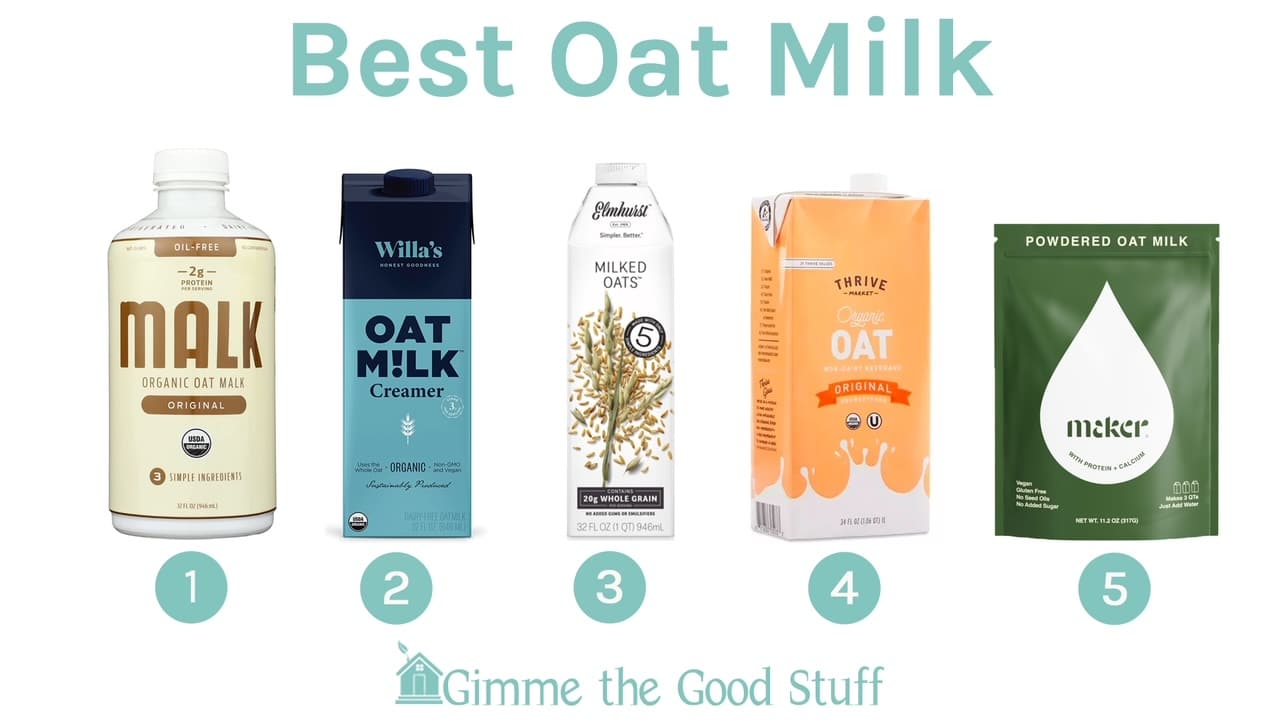
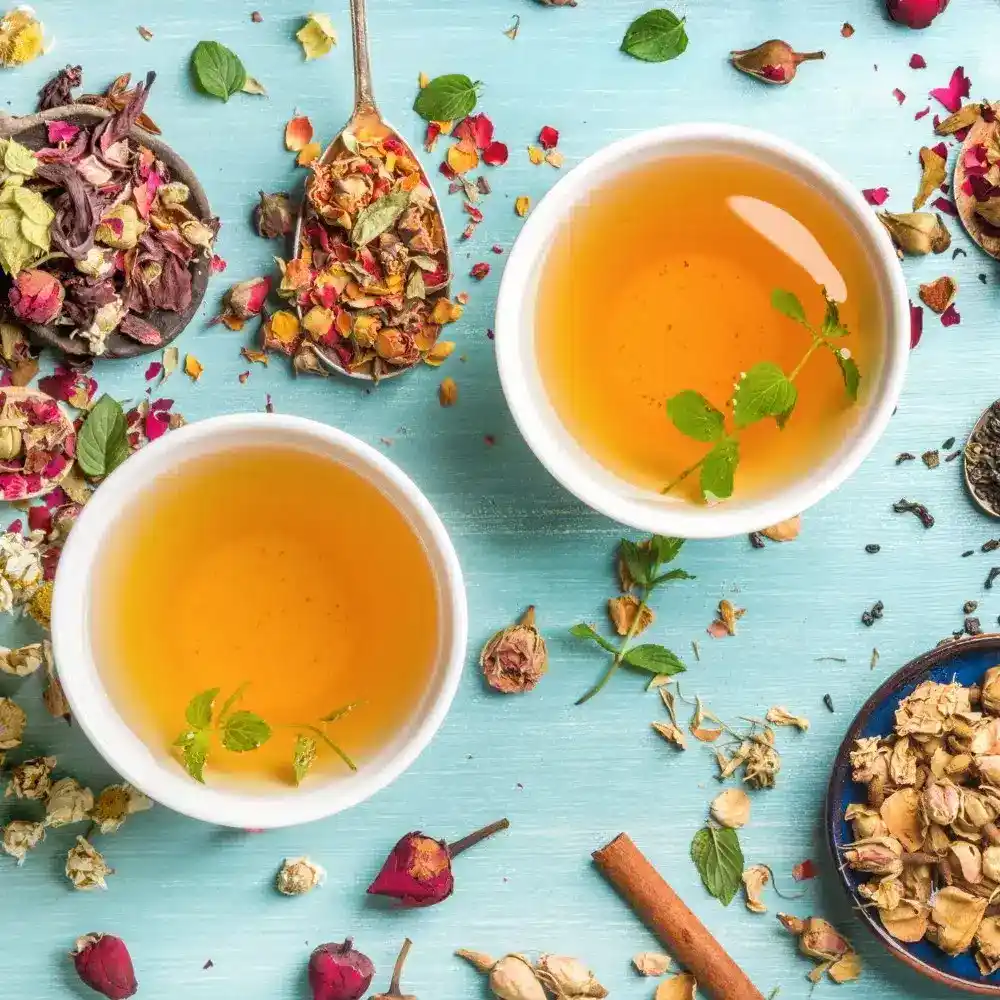



Leave a Reply
You must be logged in to post a comment.